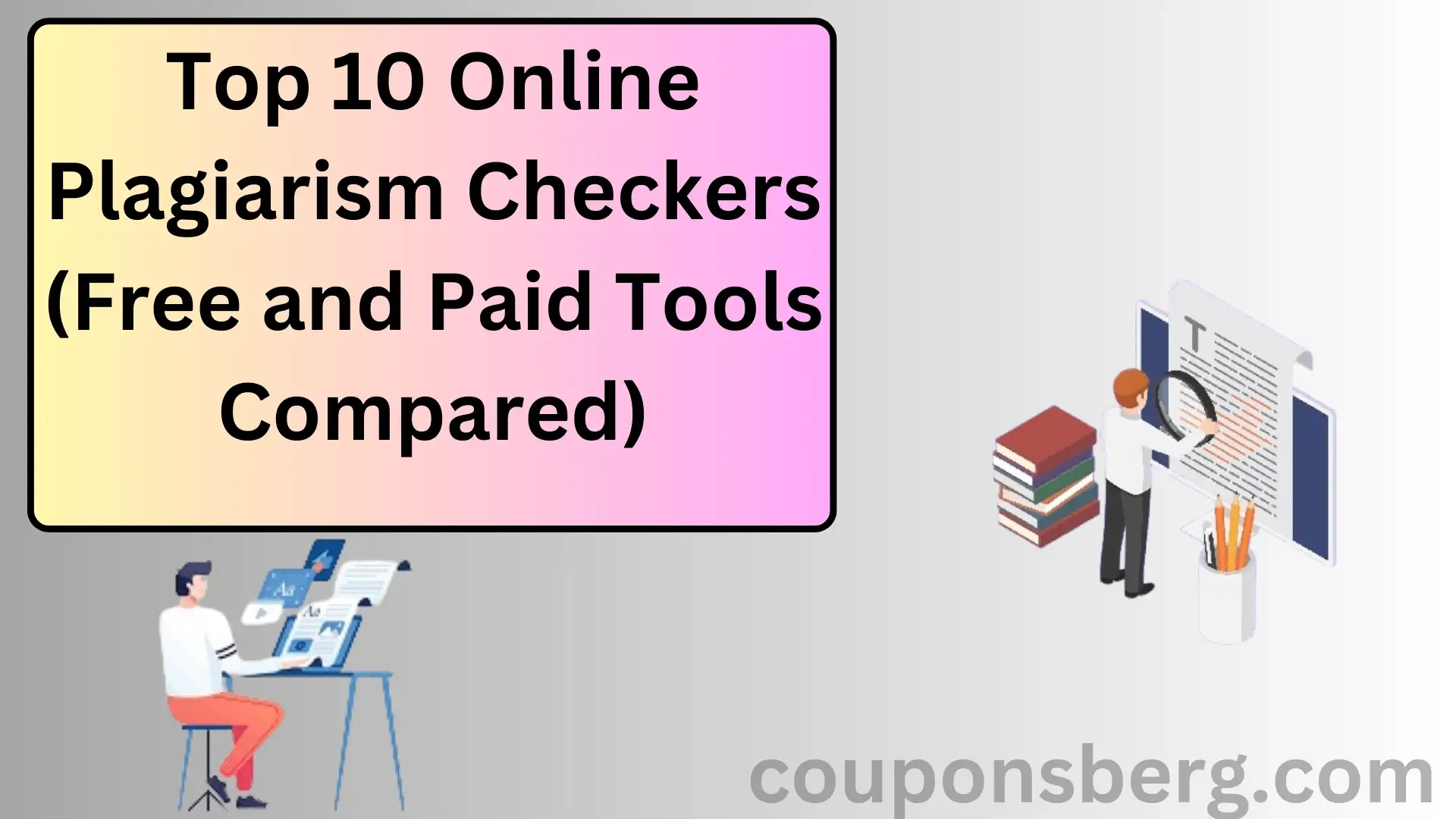Plagiarism Checkers : Anytime you offer something that isn’t your original creative work as your own, it is considered plagiarism. Whether deliberate or not, there could be a variety of repercussions, from mild embarrassment to possible legal trouble.
Make sure your writing is original and free of plagiarism at all times before posting anything online. Fortunately, there are specialised programmes for checking plagiarism that search the internet to make sure you haven’t unintentionally copied anything.
It’s likely that you’ve heard that plagiarism is bad and that you should stay away from it completely if you write for fun or as a career. Why is plagiarism seen as such a bad thing? Plagiarism, whether deliberate or not, is effectively stealing someone else’s work, which brings us to a number of ethical and moral considerations.
Today, we’ll go over the fundamentals of plagiarism, why you should never use it, and several excellent internet resources for plagiarism detection so that you can be sure every paper you write is absolutely free of plagiarism.
What Is Plagiarism

Plagiarism, to put it simply, is the practice of taking someone else’s work and passing it off as your own without giving them credit. Looking at Merriam Webster’s definition, the following is what plagiarism is described as:
“the practice of utilising someone else’s ideas or words without giving them credit”
There are several forms of plagiarism to take into account.
First of all, it is strictly forbidden to copy and paste someone else’s writing, such an article, and pass it off as your own. Always reference your sources and give credit to the author when it is appropriate.
The second kind has a stronger bearing on academic work. Suppose you paid a writer to complete an article you were given instead of trying to write it yourself. This could be viewed as plagiarism by many. Remember that this may vary if you work in a professional setting.
Hiring a freelance writer to produce blog pieces on a weekly basis, for instance, is totally acceptable if you’re a small business owner and the terms of the agreement are followed.
Overhearing discussions or ideas and then passing them off as your own is another form of plagiarism. In some cases, this is a difficult case to establish, so you should avoid this at all costs.
Using a picture, video, or audio clip that you have taken and using it on your website or publication without the artist’s consent is the last category of plagiarism. If you aren’t careful, this plagiarism case could get you in significant legal trouble, therefore you should stay away from it.
Plagiarism is often defined as using someone else’s work and passing it off as your own. Intentional or not, there might nonetheless be repercussions that range from mild embarrassment to substantial financial losses. Let’s examine some of the reasons you ought to refrain from plagiarising.
Here’s Why It Is Important to Avoid Plagiarism

Now that we’ve discussed the fundamental concepts of plagiarism, let’s examine the five reasons you should never engage in plagiarism.
1. It Can Be Embarrassing
This is the case if you accidentally copied text that has already been published. It’s embarrassing even if this is a minor infraction that may be written off as a simple error. If this occurs in a professional situation, it is extremely embarrassing. Because nobody enjoys being ashamed, you should refrain from plagiarising.
2. It Can Damage Your Reputation
Your reputation will probably suffer if you committed a major offence beyond simple plagiarism, such copying whole sections of a report to use in your own report for work. It’s possible that your supervisors no longer have as much faith in you, and regaining their trust may require a great deal of kindness and diligence.
3. It’s Illegal
You can be breaking someone’s copyright if you take their pictures and claim them as your own. Nowadays, practically everything is protected by copyright laws, and taking someone else’s work and passing it off as your own is against the law. The filmmaker, musician, and photographer put a lot of effort into that project and expected credit or remuneration in exchange. Though some cases have resulted in jail sentences, therefore proceed with extreme caution in this instance, violating their copyright could probably result in a fine. Make sure you have permission from the owner to use the product and always verify its credit.
4. Academic Consequences
If you’re a student, you’re probably familiar with the stress that comes with meeting deadlines. It’s only a few hours till a paper is due, and it will probably take the whole day to complete. Under these circumstances, a lot of students view plagiarism as an easy way out. Plagiarism regulations may apply even if the content is altered by a few words. Plagiarism in the classroom has very serious repercussions.
It is your responsibility as a student to turn in assignments and get grades that reflect your own work; therefore, if you plagiarise, you are not telling the truth. Usually, this might lead to a failing grade in the course. One instance of plagiarism at a prominent school may, in extreme circumstances, lead to expulsion. To save your reputation and status as a student, never take the chance and always prevent plagiarism.
5. It Hurts your SEO Ranking
In addition to the ethical and potential academic repercussions, Google will penalise your website for having content that has been scraped. This may have an impact on how highly your website ranks in search results, which could eventually result in less sales. Avoid taking a chance and make every effort to verify that you are not plagiarising in order to maximise your ranking.
Why You Should Use Online Plagiarism Checkers
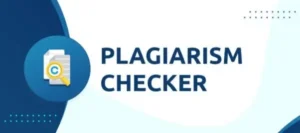
We’ve now discussed the fundamental concepts of plagiarism and the reasons you should stay away from it. The true query at this point is, “How do you avoid it?”
About 20 years ago, avoiding plagiarism required initiative and careful attention to source citation. This does not, however, truly shield you against inadvertent plagiarism of already-published web content.
Although it isn’t feasible to physically check over every word in your work to make sure it doesn’t include plagiarism, you can now accomplish it with the help of contemporary digital tools.
Online plagiarism checkers are programmes that scan your paper first, then look up every word, sentence, and phrase on the internet and compare it to anything that has ever been posted online. They are incredibly quick and help writers save a tonne of time and effort by guaranteeing that their work is entirely unique.
They frequently use sophisticated algorithms and leverage the strength of the main search engines to simultaneously scan the internet for content that is similar. For anyone who plans to write something that other people will read, these tools are invaluable. It doesn’t really matter if the work isn’t always your own when you’re just writing in your notebook every day because it’s only for you. But as soon as someone else reads it, you want to be quite certain that your work is entirely original.
The relevance of anti-plagiarism will vary depending on the kind of content. If you were sharing a quote via email with a coworker, it might not be necessary to make sure the quote is 100% original, but an essay for school or an article for a big newspaper needs to be 100% free of plagiarism.
What to Look for In Plagiarism Checkers

After discussing the fundamentals of plagiarism and the compelling arguments for using an online plagiarism detector, there are a few characteristics and features of these tools that you should take into account. Like any product, no two plagiarism checkers are alike, even though they may have features in common. These are the crucial factors to take into account when selecting a plagiarism detector.
1. Ease of Use
While some plagiarism checks merely require a few clicks to use, others may require more technical understanding. Because of this, you ought to select the one that best fits your workflow and ability level.
2. Functionality
Some plagiarism detectors merely examine your work for plagiarism, but others have further functions like grammar and spelling checks. To choose the best plagiarism detector for you, consider your needs and those of the other programmes you regularly use while writing.
3. Integration
This is a crucial point that may have an impact on your workflow. You have to copy and paste your text into and out of the text field in order to use some of the plagiarism checkers on this list, which function just as websites. Your text’s style and format may be impacted by this. This may seem like a minor point, but before checking for plagiarism, you might want to save the formatting if you are creating a brochure or poster, for example.
Some solutions on this list will work with your word processor or another application straight out of the box. This cuts out a step in the plagiarism detection process, which can ultimately save you a tonne of time and work while maintaining the format of your document.
4. Price
For their work, certain persons might require a completely functional plagiarism detector. Some could only require a simple solution that checks for plagiarism and nothing more. When compiling our rating of the top 10 online plagiarism detectors, we took cost into account. The price may or may not be a deciding issue for you, depending on your demands.
The Top 10 Online Plagiarism Checkers
Grammarly
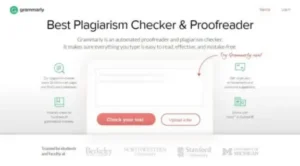
The preferred tool for educators and writers is Grammarly. Grammarly is one of the greatest resources for enhancing your writing and checking for plagiarism, regardless of whether you write professionally or just for pleasure. It checks your document for any instances of plagiarism by searching through a database of more than 16 billion web sites. It is a really powerful tool that scans your paper in a flash for plagiarism, spelling mistakes, grammar issues, and much more.
The platform is offered for free, but the paid version has access to more sophisticated features. To make the most of Grammarly, you should definitely pay the monthly fee if you want to use it frequently or write a lot.
Pros:
- Highly user-friendly and intuitive UI
- Strong plagiarism detection tools that automatically scan your material
- Extra elements that can enhance your writing
- Able to operate with Word, iOS, Android, Mac OS, and more.
Cons:
- The free version is only limited to the web and not as feature filled.
Duplichecker
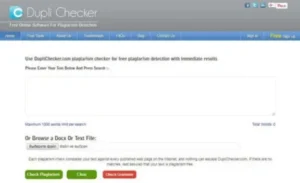
Duplichecker is an excellent free plagiarism detector that both educators and learners may utilise. The fact that it is totally free is excellent for students’ budgets. Additionally, this is a fantastic tool for business owners. You may easily verify that blog posts or other website content that you choose to outsource is entirely unique.
To utilise the tool, simply copy and paste the content into the text field. Alternatively, you can upload a Word document. In comparison to other programmes, you can get more than 50 plagiarism scans every day using this tool, which is totally free.
Pros:
- Unlimited in its usage and totally free.
- Get daily access to more than 50 plagiarism scans, which is excellent for teachers doing bulk checks.
- Easy to use and without any learning curve
Cons:
- The word count for searches is only 1000.
- To use the tool for several searches each day, you must first register a free account.
WhiteSmoke Plagiarism Checker
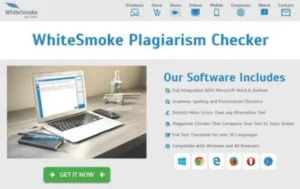
Because it offers a wide range of precise features, WhiteSmoke is among the best plagiarism detectors. Millions of people worldwide rely on this anti-plagiarism tool, which does more than just spell and grammatical checks.
The plagiarism detector may access billions of webpages that are cached in its memory. WhiteSmoke will likely detect any comparable phrases in your document if you submit one because it will search all of these websites.
WhiteSmoke is an excellent alternative to Grammarly, despite its lack of popularity. It’s still a remarkable tool. The majority of browsers, Microsoft Word, and even Outlook can be used with this plagiarism detector.
Pros:
- Can perform a comprehensive analysis by scanning your content against billions of online pages.
- Compatible with Outlook and other platforms, you can be sure that your emails are entirely unique.
- Renowned for their research publications.
Cons:
- Grammarly has a larger database than the other.
Quetext
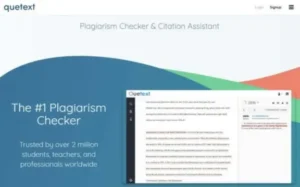
Originally, our plagiarism detector was just a simple duplicate detector. Today, in 2018, it stands as one of the top plagiarism detectors on the market. You’ll probably find the straightforward and user-friendly design pleasing even in the free edition. All you have to do is copy and paste your text, and Quetext will start searching the internet for any duplicate information.
Because it checks content for contextual plagiarism in addition to common words, the Deep Search tool is very helpful. This implies that the checker scans the lines that surround each sentence to look for patterns.
The best part is that this tool is absolutely free to use! If you want to be sure that your writings are completely free of plagiarism before turning them in, this is perhaps one of the greatest plagiarism detectors for students on our list.
Pros:
- One of the greatest free plagiarism detectors available for educators, independent contractors, students, and everyone else looking to produce unique content.
- Superior search and match technology compared to others by identifying redundant words and phrases through contextual analysis.
- Allows for the upload of several files
Cons:
- This tool’s cutting-edge Deep Search functionality is absent from the free edition.
PlagiarismCheck.org
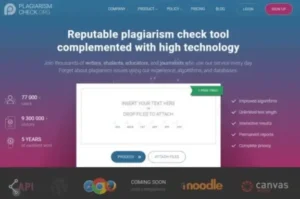
This is a trustworthy and sophisticated plagiarism detector that focuses on assisting educators in recognising instances in which their pupils submit work that has been plagiarised. In just its five years of existence, PlagiarismCheck has completely revolutionised the education sector by guaranteeing that all papers submitted adhere to the stringent requirements of educational institutions. The platform’s advanced algorithms are used by the plagiarism detector to scan any kind of document, including essays, scripts, and other types of writing.
When submitting an essay to a professor or teacher, this is an excellent tool to use to check for accidental plagiarism. To begin, simply upload your writing to the website, which will do the scanning and comparison for you against its online database that is updated on a regular basis. It will even produce a report of your copied content for you to review later.
Pros:
- Very effective plagiarism detector for students.
- There is a free trial available, but access requires a subscription.
- Several file formats, such as Word Doc, PDF, RTF, and others, are available for upload.
Cons:
- Not totally unrestricted.
- $0.30 for every 275 words. You could get more alternatives for less money if you used a service like Grammarly.
SmallSEOTools Plagiarism Checker
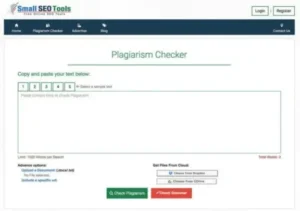
Our plagiarism detector stands out from the other checkers on our list in a few different ways. The extensive feature set that goes beyond a basic plagiarism detector is the main reason you might want to select this platform over others. It contains a tonne of helpful SEO tools that can raise your search engine rating. For small businesses or professional bloggers looking to maintain their competitive edge, this is a huge plus.
This plagiarism detector is really simple in comparison to others. The majority of your favourite features are still available, but this application has something really appealing in addition to its SEO features. You don’t need any prior technical knowledge to get started because it is quite simple to use. With SmallSEOTools Plagiarism Checker, you can utilise text that you can copy and paste.
This is one of the greatest options if all you need is a simple plagiarism detector and you don’t want to pay any money for it.
Pros:
- Extremely effective design despite its simplicity.
- gives customers access to a wide range of additional tools that can improve their material in special ways.
- Upload files from Google Drive and Dropbox, among other sources.
Cons:
- This app’s free edition is unable to compete with competing paid services.
Viper Plagiarism Checker
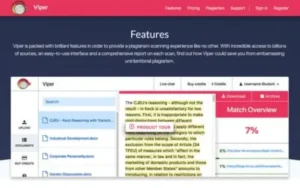
This plagiarism detector makes the claim to be a cost-free substitute for a different well-known, premium plagiarism detector. Links to related information will appear whenever you publish a document to the platform, allowing you to choose whether or not you need to mention them as a source. It is a decent free alternative even though it isn’t the greatest plagiarism checker on this list.
Pros:
- An affordable substitute for more expensive plagiarism detection programmes.
- Looks for copyrighted material in a range of sources.
Cons:
- Ideal for educational purposes only—bloggers and businesses should avoid.
Copyleaks

In addition to being a fantastic plagiarism detector, this free Copyscape substitute also offers users copyright protection. These capabilities are comparable to those of Copyscape, but this plagiarism checker is completely free!
Whether you are a teacher or a student, this is an excellent plagiarism detector to utilise in the classroom. You can save time by using this application, which enables users to upload up to 100 essays or other documents in bulk.
Pros:
- Works with nearly every language in the globe.
- uses a database that has been supplied by users.
- Two uploaded documents can be compared to each other to check for plagiarism.
- features a specific company section for SEO assistance.
Cons:
- The free plan allows you to scan 2,500 words per month.
- You must sign up for the premium plan in order to access more words and features.
Copyscape
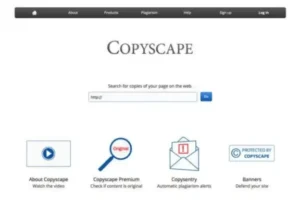
It just takes a few seconds to use Copyscape to search your blog or website for duplicate or copied content. Copyscape will verify your website against almost every website on the internet if you just provide its URL. Additionally, it will look for websites that like yours somewhat so you can see what might need to be changed.
This plagiarism detector can also be used to find out who has duplicated your work. For published writers who wish to take tough measures against plagiarism and piracy, this is fantastic. Please use this plagiarism detector if you suspect that someone is copying your work.
Pros:
- Simple to use user interface.
- Make use of their badges and banners on your website to deter content piraters.
- The WordPress plugin is quite practical and helpful.
Cons:
- Costly premium features are included.
Plagiarisma.Net
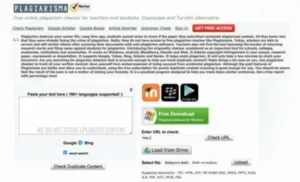
This plagiarism detector is fantastic not just for its capacity to detect copyright violations but also for the extra features it provides. Plagiarisma can be used for many different purposes, such as a grammar checker, article rewriting, text scanning, and support for Google, Yahoo, Google Books, among other services. This application can detect plagiarism for anyone, be they a blogger, teacher, or student.
Additionally, this application supports more than 190 languages, which appeals to authors everywhere. Simply copy and paste your word into the text field, and the programme will look up matches on the internet automatically. Apart from the copy and paste features, you have the option to upload a document in multiple file formats such as TXT, XML, PDF, DOX, DOCX, and HTML. Additionally, you may just copy and paste the URL of your website into the platform, and it will also function that way.
You can check for plagiarism while you’re on the road thanks to the plagiarism checker’s cross-platform compatibility, which was designed by its developers.
Both premium paid plans and a free plan are offered. Although the premium plans offer consumers many more features that you might find beneficial, the free version is still useful. Scholar Search, Synonymizer, and Similarity Checker are a few of these features.
Pros:
- Supports more than 190 languages
- Exclusive choices like Scholars and Google Books
- Supported file formats include TXT, HTML, DOC, DOCX, XLS, XLSX, FB2, PDB, PDF, RTF, ODT, and EPUB.
- Comparing Premium plans to other plagiarism checkers on this list, they are reasonably priced. For $8, you can utilise the premium features for a single day if you choose not to subscribe.
- Provide free cautionary banners to deter content pirators from stealing your ideas.
Cons:
- No assistance for users of Mac or iOS
- Microsoft Office does not offer an add-on, which is a feature that other plagiarism checkers may find helpful.
- On the slower end of the range is the scan speed.
- You are only eligible for a certain number of complimentary checks.
GET MORE INFORMATION VISIT ON…………Couponsberg.com
FAQs : Plagiarism Checkers
1. What is a plagiarism checker?
A plagiarism checker is a tool designed to detect instances of plagiarism in a text by comparing it to a vast database of academic papers, articles, books, websites, and other sources. It helps ensure the originality of the content and can identify passages that match or are similar to existing works.
2. How do plagiarism checkers work?
Plagiarism checkers use advanced algorithms to scan the text and compare it against a database of content. They identify matching phrases, sentences, or paragraphs and provide a similarity report indicating the percentage of the text that matches other sources. Some tools also highlight specific instances of potential plagiarism and provide links to the original sources.
3. Are plagiarism checkers accurate?
While most reputable plagiarism checkers are highly accurate, their effectiveness can vary based on the size and comprehensiveness of their databases. They are generally reliable for detecting direct plagiarism and common phrases but might struggle with paraphrased content or content from sources not included in their databases. Combining multiple tools and using human judgment can enhance accuracy.
4. Can plagiarism checkers detect paraphrased content?
Plagiarism checkers are increasingly capable of detecting paraphrased content, but their effectiveness varies. Advanced checkers use sophisticated algorithms and AI to identify similarities in meaning and structure, not just exact matches. However, they are not infallible and may miss some paraphrased content or produce false positives.
5. Is using a plagiarism checker considered cheating?
No, using a plagiarism checker is not considered cheating. In fact, it is a widely accepted practice to ensure academic integrity and originality. Many educational institutions, publishers, and organizations encourage or even require the use of plagiarism checkers to prevent unintentional plagiarism and maintain high standards of work.
